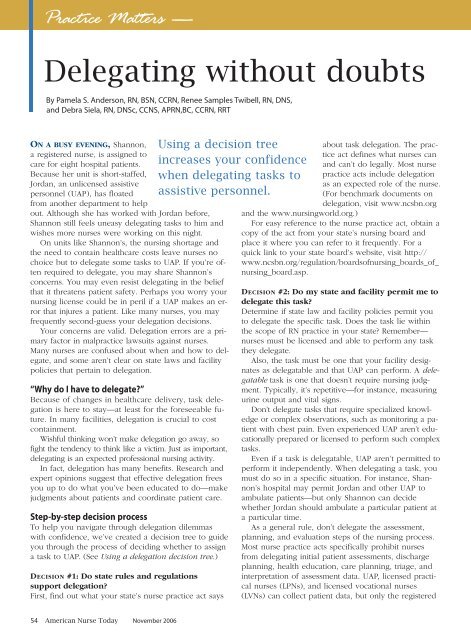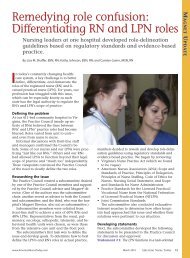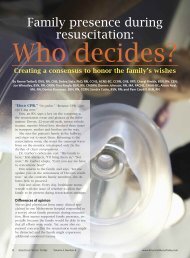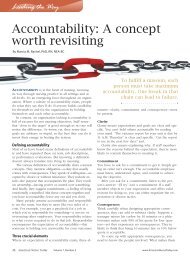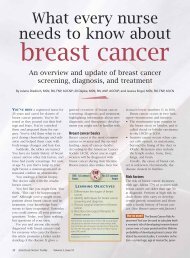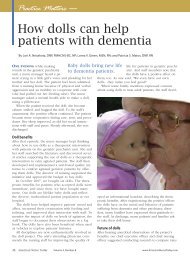Delegating without doubts - American Nurse Today
Delegating without doubts - American Nurse Today
Delegating without doubts - American Nurse Today
- TAGS
- delegating
Create successful ePaper yourself
Turn your PDF publications into a flip-book with our unique Google optimized e-Paper software.
tell Jordan exactly what she wants him to do and bywhat time he must do it? Did she request specificfeedback at a specific time? To satisfy this requirement,she might say, “I want you to reposition Mr.Sims and Mrs. Thompson every 2 hours tonight.Record each repositioning on this form. If you seeany skin redness, let me know within 15 minutes.Bring the form to me every 4 hours so we can exchangepatient updates.”Even if you’ve worked with a particular UAP for along time, avoid the urge to mind-read or make assumptionsabout what the worker understands. If yourely on the judgment of a UAP—even an experiencedone—you could be placing yourself in legal jeopardy.Be diligent in communicating and following up on delegatedtasks.Give UAP constructive feedback. At the end ofshift, Shannon might tell Jordan, “Thanks for yourhelp tonight. I’m especially glad you gave me thosefrequent vital signs on Mr. Downey. Next time, let’sconcentrate on shortening our wait timefor transports off the unit.”When UAP make mistakes, keep yourcommunications positive to maintain agood working relationship. Remember—UAP are valuable resources. The UAP who“knows” a unit is an asset. Retaining competentUAP benefits all stakeholders.By the end of decision #7, you may beexhausted and wish you could just perform the taskyourself. Resist this urge. Instead, push yourself tokeep delegating. Remember—delegating gets easierwith experience. If you’re still having difficulty, askyour colleagues for feedback on your delegation decisions.Who’s responsible for mistakes UAP make?Suppose Shannon delegates a task correctly but Jordanmakes an error that injures the patient. Who’s legallyresponsible?When he agreed to perform the task, Jordan becamelegally responsible for his own actions. But Shannonremains accountable for the outcome of the task. She’srequired to evaluate the outcome of Jordan’s work andcorrect any errors.Nonetheless, the extent of a nurse’s liability for UAPerrors isn’t clear from recent legal rulings. In some cases,delegating RNs were found liable; in others, the facility,UAP, or both were found liable.Affirmations to ease your anxietyIf you’re still feeling anxious about delegating tasks, repeatthe following affirmations to yourself:• I’m familiar with state and facility delegation guidelines.• I know what types of delegation are legal. My colleaguesand I support each other within thesenorms.• I know how to determine whether a UAP is preparedto perform a task.• I can let go of tasks I’ve always done. I can learnnew skills and eventually enjoy them.• I will gain confidence in delegating as I gain experience.• I feel comfortable requesting peer review for mydelegation decisions and will modify my decisionmaking as needed.Write down these affirmations and place them on amirror, screensaver, or pocket card.Setting an achievable goalYou know you’re making sound delegation decisionswhen you assign a competent UAP a simple task notrequiring nursing judgment in a predictable patientcontext. It may sound like a complex goal, but it getseasier with practice.Push yourself to keep delegating.Remember—delegating gets easierwith experience.As your delegation skills improve, celebrate yoursuccesses. Focus on how delegation benefits you, yourteam members, and your patients. With courage,knowledge, and practice, you’ll be delegating effectivelyin no time.✯Selected references<strong>American</strong> <strong>Nurse</strong>s Association. Principles of Delegation, 2005. Availableat: http://nursingworld.org/staffing/lawsuit/PrinciplesDelegation.pdf.Accessed July 27, 2006.Croke E. <strong>Nurse</strong>s, negligence, and malpractice: an analysis based onmore than 250 cases against nurses. Am J Nurs. 2003;103:54-64.Gosfield A, Reinertsen J. The 100,000 Lives Campaign: crystallizingstandards of care for hospitals. Health Aff. 2005;24:1560-1570.Hansten R, Jackson M. Clinical Delegation Skills: A Handbook for ProfessionalPractice. 2nd ed. Sudbury, Mass: Jones and Bartlett; 2004.Mahlmeister L, Koniak-Griffin D. Professional accountability and legalliability for the team leader and charge nurse. J Obstet GynecolNeonatal Nurs. 1999:28(3):300-309.Pamela S. Anderson, RN, BSN, CCRN, is a Staff <strong>Nurse</strong> in the intensive care unit atBall Memorial Hospital in Muncie, Ind. and a graduate student in the <strong>Nurse</strong>Practitioner program at Ball State University in Muncie. Renee Samples Twibell,RN, DNS, is Associate Professor at the School of Nursing at Ball State University;she is also a <strong>Nurse</strong> Researcher and a Staff <strong>Nurse</strong> in the progressive care unit at BallMemorial Hospital. Debra Siela, RN, DNSc, CCNS, APRN,BC, CCRN, RRT, is AssistantProfessor at the School of Nursing at Ball State University; she is also an ICUClinical <strong>Nurse</strong> Specialist at Ball Memorial Hospital.November 2006 <strong>American</strong> <strong>Nurse</strong> <strong>Today</strong> 57


